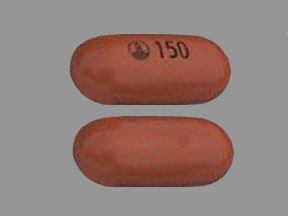Nintedanib Dosage
Medically reviewed by Drugs.com. Last updated on Jun 9, 2025.
Applies to the following strengths: 100 mg; 150 mg
Usual Adult Dose for:
Additional dosage information:
Usual Adult Dose for Idiopathic Pulmonary Fibrosis
150 mg orally twice a day (every 12 hours)
Maximum daily dose: 300 mg
Comments:
- Conduct liver function tests prior to initiating therapy.
- Perform a pregnancy test in females of reproductive potential before starting treatment.
Uses:
- For the treatment of idiopathic pulmonary fibrosis (IPF)
- For the treatment of chronic fibrosing interstitial lung diseases (ILDs) with a progressive phenotype
- To slow the rate of decline in pulmonary function in patients with systemic sclerosis-associated interstitial lung disease (SSc-ILD)
Usual Adult Dose for Interstitial Lung Disease
150 mg orally twice a day (every 12 hours)
Maximum daily dose: 300 mg
Comments:
- Conduct liver function tests prior to initiating therapy.
- Perform a pregnancy test in females of reproductive potential before starting treatment.
Uses:
- For the treatment of idiopathic pulmonary fibrosis (IPF)
- For the treatment of chronic fibrosing interstitial lung diseases (ILDs) with a progressive phenotype
- To slow the rate of decline in pulmonary function in patients with systemic sclerosis-associated interstitial lung disease (SSc-ILD)
Renal Dose Adjustments
Mild to Moderate Renal Dysfunction (CrCl 30 to 90 mL/min): No adjustment recommended.
Severe Renal Dysfunction (CrCl less than 30 mL/min): Data not available
Liver Dose Adjustments
LIVER DYSFUNCTION:
Mild Liver Dysfunction (Child-Pugh A): 100 mg orally twice a day (every 12 hours)
Moderate or Severe Liver Dysfunction (Child-Pugh B or C): Use is not recommended.
LIVER ENZYME ELEVATIONS:
- AST or ALT between 3 to 5 times the upper limit of normal (3 to 5 x ULN) without signs of liver damage: Interrupt therapy or reduce the dose to 100 mg orally twice a day (every 12 hours); once values return to baseline, resume at reduced dose and if tolerated, increase to full dose of 150 mg orally twice a day (every 12 hours).
- AST or ALT greater than 3 x ULN and WITH signs of liver damage: Discontinue therapy
- AST or ALT greater than 5 x ULN: Discontinue therapy
Dose Adjustments
Dose Adjustment for the Management of Adverse Reactions:
- Consider dose reduction or temporary treatment interruption until reaction has resolved to levels that allow therapy continuation.
- May resume therapy at full dosage of 150 mg orally twice a day (every 12 hours), or reduced dosage of 100 mg orally twice a day (every 12 hours); increase to full dose if tolerated.
- Discontinue therapy in patients who cannot tolerate 100 mg orally twice a day (every 12 hours).
- Patients with mild liver dysfunction (Child-Pugh A): Consider treatment interruption or discontinuation for the management of adverse reactions.
Precautions
CONTRAINDICATIONS: None
Safety and efficacy have not been established in patients younger than 18 years.
Consult WARNINGS section for additional precautions.
Dialysis
Data not available
Other Comments
Administration advice:
- For oral use
- Administer this drug with food.
- Capsules should be swallowed whole with liquid; do not chew due to bitter taste.
- Do not open or crush capsules; wash hands immediately and thoroughly if contact with contents occurs.
- If a dose is missed, the next dose should be taken at the next scheduled time; patients should not make up for a missed dose.
Storage requirements:
- Store at 20C to 25C (68F to 77F); excursions permitted to 15C to 30C (59F to 86F).
- Protect from exposure to high humidity and avoid excessive heat; if repackaged, use USP tight container.
General:
- It is recommended that patients stop smoking during treatment. Cigarette smoking was associated with decreased drug exposure.
Monitoring:
- Hematologic: For bleeding in patients on chronic, full dose anticoagulation (during treatment)
- Hepatic: Liver function tests, including AST/ALT and bilirubin (prior to treatment, monthly during first 3 months, and then every 3 months as clinically indicated; assess promptly in patients reporting signs of liver injury)
Patient advice:
- Read the US FDA-approved patient labeling (Patient Information).
- Take this medication with food and swallow capsules whole.
- Understand that monitoring of liver function tests is recommended prior to treatment and periodically; report any symptoms of a liver problem.
- Contact your health care provider at the first signs of diarrhea, nausea, and vomiting.
- Report any signs and symptoms of unusual bleeding, gastrointestinal perforation, or proteinuria.
- Seek immediate medical attention if signs/symptoms of acute myocardial ischemia occur.
- Stop smoking prior to and during treatment, if possible.
- Female patients of childbearing potential: Avoid becoming pregnant during treatment. Notify your health care provider of a known/suspected pregnancy. Breastfeeding is not recommended during therapy.
Frequently asked questions
More about nintedanib
- Check interactions
- Compare alternatives
- Reviews (37)
- Side effects
- During pregnancy
- Drug class: multikinase inhibitors
- Breastfeeding
- En español
Patient resources
Other brands
Professional resources
Other brands
Related treatment guides
See also:
Further information
Always consult your healthcare provider to ensure the information displayed on this page applies to your personal circumstances.


